#vincent rottiers
Explore tagged Tumblr posts
Text

#Nocturama#Finnegan Oldfield#Laure Valentinelli#Martin Petit-Guyot#Hamza Meziani#Manal Issa#Jamil McCraven#Ilias Le Doré#Rabah Nait Oufella#Robin Goldbronn#Vincent Rottiers#Bertrand Bonello#2016
4 notes
·
View notes
Text
Au procès de Christophe Ruggia, Adèle Haenel veut « rendre justice à l’enfant que personne n’a protégée »
by Sophie Boutboul - Mediapart, December 10, 2024

On Monday, the first day of the director's trial for sexual assault of a minor against the actress, the latter explained that she was speaking «to shatter the isolation of children» who are victims of pedophiles. [Ruggia] continued to deny the facts.
«Adèle, we believe you», «victims, we believe you», shouted the forty or so people on the steps of the Paris courthouse, present to support actress Adèle Haenel, who filed a complaint against director Christophe Ruggia five years ago, after testifying in Mediapart.
Contrast this with the silence of the courtroom, where for two days Christophe Ruggia has been on trial for sexual assaults on a minor, committed in Paris between September 1, 2001 and February 10, 2004, with the aggravating circumstance of having been a person in authority over the victim. Adèle Haenel was between 12 and 14 years old at the time. According to the examining magistrate, these assaults took place on a «weekly» basis. Christophe Ruggia does not deny these meetings. He denies what took place.
Many of the actress's friends and family came to support her, including director Céline Sciamma in the front row. For over an hour, presiding judge Gilles Fonrouge summarized the main points of the investigation, while Adèle Haenel took notes, seated in the front row of the civil parties' bench, looking straight ahead and often in the direction of Christophe Ruggia, who was fully turned toward the judge, motionless.
At the end of the hourlong summary of the case, the judge, at the request of the civil parties, screened seven clips from the film Les Diables, in which Adèle Haenel as a child is seen undressed or naked most of the time, in moments of caressing and kissing between herself and the actor Vincent Rottiers, who play a supposedly abandoned brother and sister but in fact turn out to have no blood ties.
On the stand for over three hours, slightly stooped in his black jacket, Christophe Ruggia sometimes digressed, often answering by avoiding the point of the court's questions. He continued to deny all [allegations of] sexual assault. According to him, Adèle Haenel wanted to «launch #MeToo in France» and «it landed» on him.
The presiding judge attempted to understand the context. He questioned [Ruggia] about the relationship between his characters played by Adèle Haenel and Vincent Rottiers, «a relationship that could be perceived as incestuous at the start, which he has very young children enacting».
«Overwhelmingly sensual»
The filmmaker conceded that it «doesn't seem impossible to him that Adèle Haenel might have imagined» that he was in love with her, given that he was «fascinated» by her and «loved the actress». The judge asked: «When you write to her that your love is absolutely sincere, how is a very young woman to interpret that if it coincides with actual tactile physical closeness?» Once again, the director's response was a little evasive, arguing that it was a matter of expressing his «love that was too much to bear», as he put it. Despite his writings at the time, he insisted that he was never «in love» with the young actress.
Referring to Adèle Haenel's mother, who may have found the relationship between a 36-year-old man and a 12-year-old child «disturbing», the judge asked Ruggia if he had «considered the accuracy» of her attitude. The director repeatedly replied in the negative. The judge finally concluded: «We’re not going to make any progress on this issue.» The same goes for the sexualization of Adèle Haenel, which he continued to deny, despite his words describing her as «overwhelmingly sensual» and his Google search for «Adèle Haenel hot» in 2011.
To explain why he denied the facts, he told the court that, in his opinion, the actress lied based on the version she gave to the police:
«Why is this young woman lying?» asked one of the assessors.
- Because between the time of the Mediapart article and the suit, she figured that she had to go further, she hadn't planned to go to court at first...
- Why would she want to hurt you so much? asked the assessor.
- I think she's been radicalized with #MeToo [...] Look at her trajectory over the last five years, it started with me, then it was the César awards with Roman Polanski, then her support for Adama Traoré, then her involvement with Révolution Permanente, her attacks on cinema as a whole and on ministers...» he concluded.
Regarding the context of the revelations, the judge recalled that, according to Ruggia, there had been «no influence» in his relationship with Adèle Haenel, but that, according to him, «an influence would instead be exerted» by Céline Sciamma, the actress's former partner. «However, said the judge, since the end of that relationship, they have remained close and good friends, whereas yours led to a brutal and definitive break-up. Do you still maintain the notion of influence?» Christophe Ruggia replied, «That's my interpretation, and I do indeed think she's still under Céline Sciamma's sway.» Laughter erupted in the courtroom. The judge called the spectators to order for the «dignity of the proceedings».
At times, Ruggia seemed to half-heartedly acknowledge certain things: «I wasn't aware at the time that she was traumatized by the film, I realized that the fact that we saw each other often was too much for her.»
Asked about the «boundaries» he didn't set, notably in a scene that only he remembers - he describes her «licking his ear» in front of her parents, and his blowing in her ear in response - he again avoided answering. «What should an adult's response be to a child licking your ear?» asked the assessor. «It's something that couldn't happen these days», he replied. «Who set the boundaries at that moment? Let's imagine this scene had existed, which everyone but you denies. Who set the boundaries?» insisted the assessor, without getting a clear answer.
A rally in support of the actress
«We support her, we believe her, we see her. It's important to show the justice system that we're united, given the tiny number of suits that aren’t dismissed», says Cami, 25, holding a small sign reading «Adèle, you are not alone». She was one of around forty people who came to support Adèle Haenel on the courthouse steps on Monday, December 9. The young woman mentions that she herself filed a suit for rape of a minor four years ago, and that she still hasn't heard anything.
Arnaud Gallais, co-founder of the Mouv'Enfants association and former member of la Commission indépendante sur l’inceste et les violences sexuelles faites aux enfants (Ciivise) [the Independent Commission on Incest and Sexual Violence against Children], points out: «When 97% of men assault 81% of young female victims, you can see that for the most part, it's men who rape children. These are the statistics of impunity, for permission to rape and re-offend, so being here today is also political.»
Vanina, 54, who works in the film industry and wears a «Support Ciivise, I believe in you, I protect you» sticker on her coat, said it was «important for Adèle Haenel to know that we are grateful for her»: «I don't expect much from this trial, but there’s always hope. As a child of incest myself, my suit was dismissed.» Colombe, a visual artist, hopes that this trial will not be «another violation» for the actress.
Prosecutor Camille Poch referred again to the «semantic field of sex» that he uses when talking about Adèle Haenel or in his Google searches. In this context, he noted: «When [Bertrand] Bonello's film was released, if you searched it in Google, it would bring up “Adèle Haenel hot”, so I clicked on it [...] Yes, she's sensual, that's the heart of the film, she's going to show her body. Yes, Adèle Haenel had an overwhelming sensuality, which she still has today», he even dared to say.
«He destroyed everything»
Around 7pm, Adèle Haenel was called to the stand. She approached with a firm, determined step, and delivered testimony that alternated between emotion and anger, pleading for the protection of the child she used to be, and for all child victims of pedophiles.
She would be questioned for a long time about her choice to speak in a press article and not to take her case to court first. «At the time I spoke in 2019, there were so many dismissals, I'm not telling you anything you don’t already know, I didn't want to add violence to violence.»
Speaking about the film Les Diables, she recounted the «confusion Christophe Ruggia fostered between the love of acting and the love for himself, a shifting of reality»: «There was no longer any demarcation for intimacy, for sexuality, and I found myself being directed to touch myself like in the film [...] Mr. Ruggia became the main adult in my life, I had a normal life, friends, a brother, and he destroyed everything.»
Asked by the judge about the impact these assaults have had on her, she described how «devastating» it has been, particularly with respect to «disparagement and self-hatred». She talks about her «depression», the work she has done on herself since 2016. «These days, things are getting better.»
The judge then asked her again about not referring her case to court. The actress replied simply: «The truth is, I didn't even think about it, I thought the courts would never be interested in my story, what I’d been through in those years, nobody cared about what happened to me.»
The assessor then asked her about the Saturdays during which she described the assaults, Saturdays on which he bought her snacks: Cadbury Finger blanc cookies and Orangina, her «favorite».
«Can you explain why a 12-year-old child would keep going back?» the judge asked the actress.
- It's horrible, I thought I owed it to him, that it was my fault. When he drove me home, he told me that the others wouldn't understand, he made the situation seem normal, and I felt obliged to go [...] I felt indebted to him.»
Adèle Haenel then talked about her response to the assaults that she is denouncing. She described in detail, speaking more and more rapidly, about what she remembers: «In his living room, it's a half-normalized conversation, thanks to a joke or a laugh, for example, he would come and sit down right next to me, and “you’re too funny my little whale, my baby girl”, I tighen up, I'm on the sofa, I get tense, my body tenses up, he goes on, interjecting a few words as if it were normal, his hand partly on my thigh, “ah là là your top is really cute”, sliding his hand part of the way under my collar, I'm so tense, I curl up as much as possible in the corner of the sofa... If he thinks I'm resisting too much, he'll stop for a moment, look at me like, “what the hell?” and starts again.»
Adèle Haenel responded to his saying that none of these things ever happened: «He’s a big liar, you’re a big liar, Mr. Ruggia», she said, turning to him.
The actress also told the court about the moment when she said to stop. «I got up from the sofa, went over to the window and said “this has gone too far, this has to stop”, he was still next to the imprint of my body on the sofa, I said it again, then he brought me back, [...] he was trying to use his film [a project in progress - ed. note] as a reason to keep me because he said I couldn't do that to him.»
Asked by one of her lawyers, M Michelin, about the preparation of the film and the sex scenes in particular, Adèle Haenel explained: «That child should have been protected, it was possible to do so. I don't think I said much, no one tried very hard to break the silence.»
As her testimony went on, her words became louder, more raw: «Today, I'm an adult, but back then, I was a child. He says: “You're the one who jumped on my lap, you're the one who touched yourself.” But who was the adult? Who was supposed to set boundaries? I felt disgusting and it was never his fault, all these nasty people around me and he's the nice guy who gave me Cadbury Finger blanc cookies! I'm sorry I'm getting upset, we're talking about at least a hundred Saturdays... »
As Adèle Haenel spoke, she went back over the details of the assaults and apologized to the court at times: «I'm so sorry, it's stressful to talk about this, he says my statements have changed but no, I’ve always tried to tell it as best I could with the words I had, the shame I had.»
At one point, she returned to one of the court's first questions, namely whether she had thought about the consequences for Christophe Ruggia when she spoke out in Mediapart. «All I did was protect him when I was a kid, I didn't even think that I had the right to defend myself, that it wasn't okay to be touched like that [...] There was a total inversion of the meaning of things. This guy, he pretends there was an equality with a 12- and 13-year-old child, he’s never stopped sexualizing me, saying “she jumped on me, she looked at me with pornographic eyes”, is that even real? It disgusts me, I'm sorry to get upset but frankly...»
In response to Ruggia's defense that she wants revenge, Adèle Haenel stated: «I'm not driven by revenge, I want justice for this child whom no one protected, who got through it all on her own.»
Her lawyer Yann Le Bras referred to the «rather unusual judicial treatment» his client received, for example a twelve-hour police hearing. «Totally unusual» said the actress, who continued: «I spoke out thinking of the children, thinking about all those who are told “don’t destroy the family” [...] I spoke out hoping to ease a little of the isolation of all these children, because I've lived this isolation, and I know how it made me want to die. It's the most important thing I've done in my life, trying to shatter the isolation of children in my situation.»
Adèle Haenel talked about her «shame» and the fact that at first she found it hard to put into words what had happened to her. To Véronique Ruggia, Christophe Ruggia's sister, who will be heard on Tuesday December 10, she explained that she spoke «half-heartedly»: «I always used the term “second base” with her, I was in a very raw emotional state, so I scratched my head until it bled, and I've never stopped since. I've always tried to take care of the people I talk to...»
At the end of her testimony, Adèle Haenel explained that when she received the order to refer her case to the correctional court - a document written by the examining magistrate to support her decision to go to trial - she felt very emotional: «Seeing it in black and white, the “consistency” of my words, the “massive psychological repercussions”, wow, it had an effect on me, this recognition, so much isolation around it, I'm proud to have managed to hold it together throughout this process and life that have been so painful.»
[Please don’t repost this anywhere, in part or in whole. Feel free to reblog, or at least cite your source and provide a link back here. Asking permission would be nice in an ideal world, but I’m a realist – I know far too well how easy it is to appropriate stuff on Tumblr. I would be the first to admit that my translations are not perfect – there are some words and phrases that simply do not drop neatly into an equivalent in English, and I constantly fix typos and make changes or corrections in older posts – but they do take a lot of work and time. Thanks for understanding. - C.]
h/t to @thexfridax for the article! Thank you, Ros!
#Adèle Haenel#my translation#Mediapart#December 2024#JFC‚ this was hard to read#I've tried to translate the judicial terms as accurately as possible‚ but I'm not entirely sure they're correct#and I've left Adèle's words pretty much as they're transcribed‚ showing how upset and passionate she was on the stand#as that one supporter says‚ I don't hold a lot of hope that that asshole will actually be brought to justice#but it's a start#though I have to think‚ what the FUCK were her parents doing at the time?!?
25 notes
·
View notes
Text

Nocturama (Bertrand Bonello, 2016)
Cast: Finnegan Oldfield, Vincent Rottiers, Hamza Meziani, Manai Issa, Martin Petit-Guyot, Jamil McCraven, Raban Nait Oufella, Laure Valentinelli, Ilias le Dore, Robin Goldbronn, Luis Rego, Hermine Karagheuz, Adèle Haenel. Screenplay: Bertrand Bonello. Cinematography: Léo Hinstin. Production design: Katia Wyszkop. Film editing: Fabrice Rouaud. Music: Bertrand Bonello.
Nocturama is a kind of existential thriller in which a group of young people bomb and burn various Parisian landmarks. I use the word "existential" because their terrorism appears to be unmotivated; it's an acte gratuit thatseems to stem from no political or social dissatisfaction. The narrative is elliptical: We watch the members of the group as they cross Paris to assemble at their various assigned targets before we even know where they're going and why. Eventually, there's a flashback that shows their preparatory meeting, but even that supplies only the most rudimentary information: that the explosive is semtex, which has been procured for them an older man named Greg (Vincent Rottiers). Their several missions accomplished, they regroup in a department store that's closed for the night, where they raid the food and wine department, try on the clothes, listen to music, and watch the news, which eventually reveals that their hideout has been discovered. Two of them are missing: One is killed in a showdown with a security guard, while Greg suffers a fate that we learn about in a curious way. The outcome is presented with a cold-blooded detachment. Bertrand Bonello breaks no new ground for the thriller genre, but skillfully plays with the viewer's reactions to the young protagonists, an alternation of censure and sympathy.
2 notes
·
View notes
Text

CINE Renoir (2012) Francia Dirección: Gilles Bourdos Idioma: Francés con Subtítulos en Español
Atención: Solo para ver en PC o Notebook Para ver el Film pulsa o copia y pega el Link: https://memoriasdelcafe.blogspot.com/2025/02/renoir-2012.html
Reparto: Michel Bouquet, Christa Theret, Vincent Rottiers, Thomas Doret, Michèle Gleizer,
Género: Drama | Biográfico. Años 1910-19
SINOPSIS: La Costa Azul, 1915. Auguste Renoir, en el ocaso de su vida, está atormentado por la pérdida de su esposa, los dolores artríticos y la noticia de que su hijo Jean ha sido herido en la guerra. Sin embargo, cuando una joven entra en su mundo, el pintor se siente dueño de una nueva energía. Radiante de vida, bellísima, Andrée se convertirá en su última modelo. Jean regresa a casa para reponerse y también cae bajo el encanto de la estrella pelirroja que brilla en el firmamento de la casona de los Renoir. A la vez que se enamora de la joven, empieza así mismo a desarrollarse el célebre cineasta que más tarde fue.
Crítica: "Una película luminosa, de enorme belleza plástica, muy inspirada por los cuadros del pintor, que habla de la alegría de vivir, de la creación artística, y de las relaciones familiares." -Boquerini: Diario ABC
Premios: 2012: Festival de Cannes: Sección oficial a concurso (sección "Un Certain Regard") 2013: Premios César: Mejor vestuario. 4 nominaciones
Café Mientras Tanto jcp
0 notes
Text
Jusqu'ici tout va bien
Jusqu'ici tout va bien (Serie 2023) #NawellMadani #KahinaCarina #CarimaAmarouche #PaolaLocatelli #AidaGuechoud #MayaneSarahElBaze Mehr auf:
Serie / Thicker Than Water Jahr: 2023- (April) Genre: Krimi / Thriller Hauptrollen: Nawell Madani, Kahina Carina, Carima Amarouche, Paola Locatelli, Aïda Guechoud, Mayane Sarah El Baze, Djebril Zonga, Paul Hamy, Vincent Rottiers, Walid Afkir, S Pri Noir, Radouan Leflahi … Serienbeschreibung: Fara (Nawell Madani) träumt davon, die Hauptmoderatorin des Senders zu werden, bei dem sie arbeitet,…
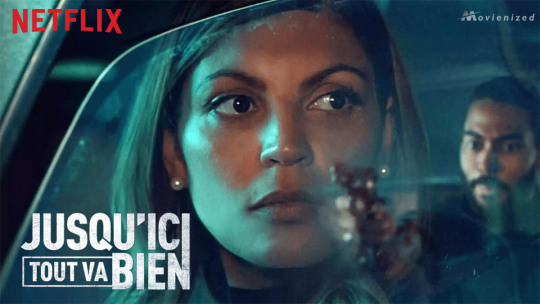
View On WordPress
0 notes
Photo










Sympathie Pour le Diable (2019) Dir. : Guillaume de Fontenay
#Sympathie Pour le Diable#Guillaume de Fontenay#cinema#Niels Schneider#Ella Rumpf#Vincent Rottiers#Arieh Worthalter#Siege of Sarajevo#war#Paul Marchand#journalism#2019#olvaset#Cocorico Motherfuckers !
64 notes
·
View notes
Photo


Sauver ou Périr
Frédéric Tellier, 2018 (1h57)
1 note
·
View note
Photo

Sympathy for the Devil
1992, war is raging in what will become Ex-Yugoslavia. Paul is covering the siege of Sarajevo. Flamboyant dandy, loud mouth, adrenaline junkie, provocative cigar-smoker, Paul Marchand is the war correspondent archetype. Racing through Sniper's Alley in his white Ford, the Frenchman relentlessly tells the apathetic western world about the ongoing massacre . In a urban war zone where everything that moves is a target, Paul tries to live, love and inform. How much can he endure before he starts taking up arms?
1 note
·
View note
Photo
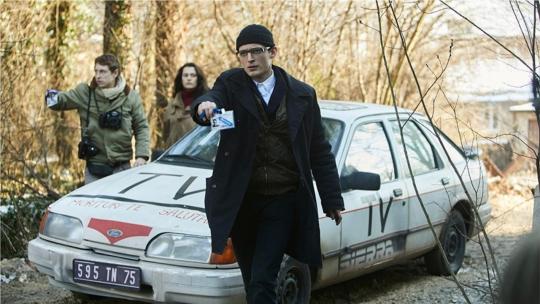
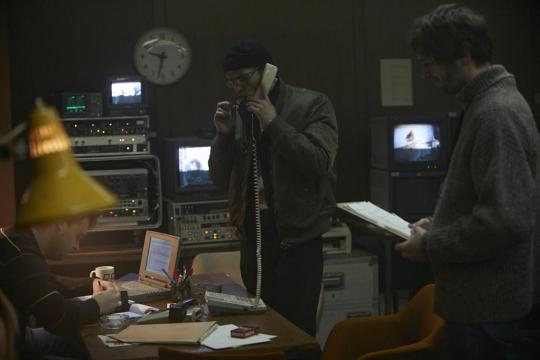

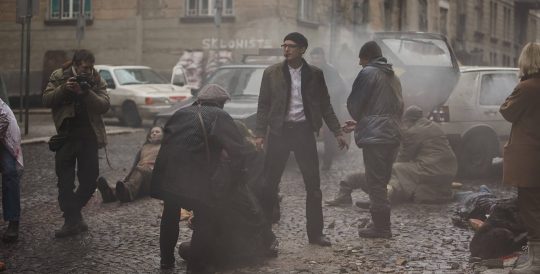
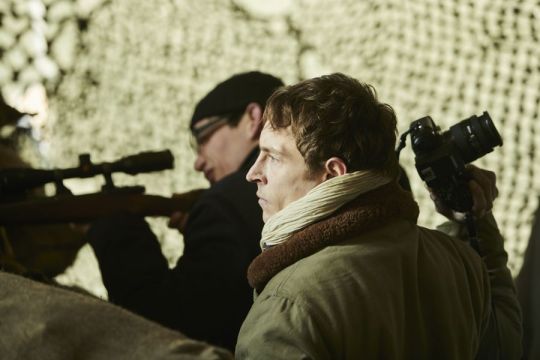
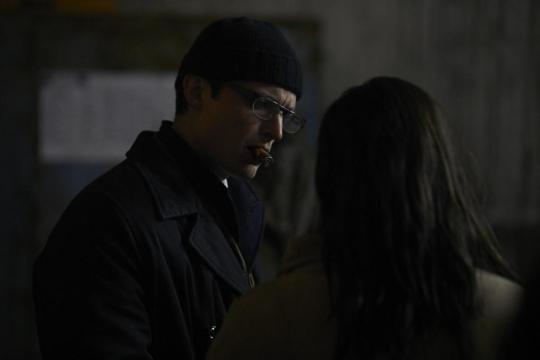
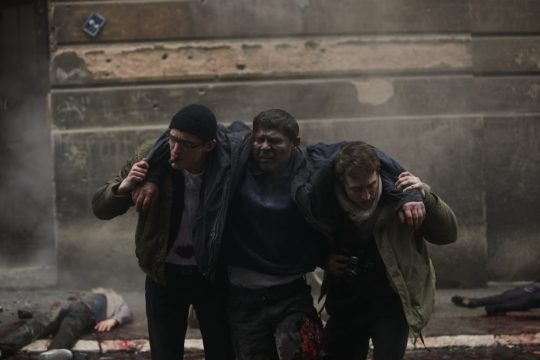
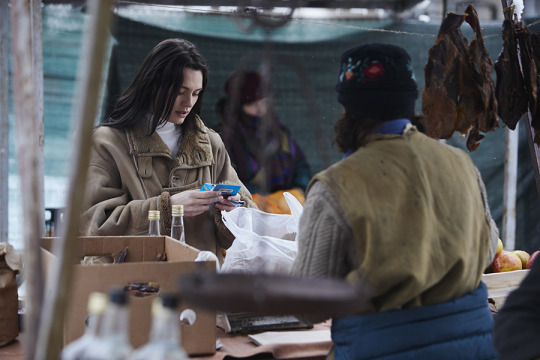
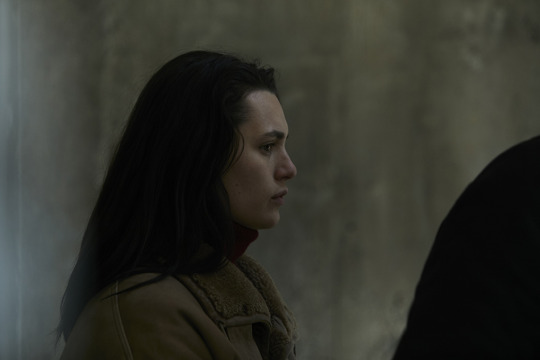
On pourrait interpréter le titre de bien des manières. “Sympathie pour le diable” pourrait s’appliquer à Paul Marchand lui-même, ce journaliste emblématique qui couvrit entre autres la guerre de Bosnie Herzégovine en 1992. Le titre avait été choisi par lui-même, en référence aux Rolling Stones qui était son groupe fétiche et parce que le titre collait si bien à son mode de vie, accro à l’adrénaline, et à cette guerre, sale comme bien des guerres. Dans son livre “Sympathie pour le Diable”, Paul Marchand raconte son expérience à Sarajevo, son combat pour dire et montrer la réalité de la guerre et pour ne pas être un simple spectateur impuissant. Le projet du film est lancé en 2006, alors que Paul Marchand est encore en vie mais ce n’est qu’en 2018 qu’il se concrétise finalement avec Niels Schneider, une fois encore méconnaissable, dans le rôle de Paul. Guillaume de Fontenay parvient à nous donner une idée d’ensemble du personnage, parfois antipathique mais toujours droit dans ses convictions et jusque boutiste. La réalisation est soignée, la reconstitution réaliste et les acteurs convaincants.
#sympathie pour le diable#guillaume de fontenay#niels schneider#ella rumpf#vincent rottiers#paul marchand#journaliste#reporter de guerre#guerre#sarajevo#bosnie herzégovine#guerre de bosnie#film#cinéma#biopic
6 notes
·
View notes
Photo


Nocturama | dir. Bertrand Bonello (2016)
2 notes
·
View notes
Photo

Dheepan (2015) Jacques Audiard
16-08-2019
An emotional and powerful look at a period in the lives of three refugees of war as they start a new life together
#dheepan#2015#jacques audiard#france#jesuthasan antonythasan#kalieaswari srinivasan#claudine vinasithamby#vincent rottiers#faouzi bensaidi#marc zinga
1 note
·
View note
Photo

Sympathy for the Devil (Sympathie pour le diable), Guillaume de Fontenay (2019)
#Guillaume de Fontenay#Jean Barbe#Niels Schneider#Vincent Rottiers#Ella Rumpf#Arieh Worthalter#Adnan Omerovic#Mirsad Ibisevic#Clément Métayer#Toussaint Colombani#Elisa Lasowski#Pierre Aïm#Mathilde Van de Moortel#2019
2 notes
·
View notes
Photo




Un Ange (2019)
un film réalisé par Koen Mortier
Photo : Fatou N'Diaye, Vincent Rottiers
Copyright : Stephan Vanfleteren
Une star du cyclisme impliquée dans une affaire de dopage décide de s’exiler quelques jours au Sénégal et. tombe amoureux d'une prostituée. Lorsqu'il trouve la mort dans des circonstances douteuses, elle est arrêtée ...
Film librement inspiré de la vie de Frank Vendenbroucke, vainqueur de Paris-Nice 1998, mort à l’âge de 34 ans le 12 octobre 2009 d’une double embolie pulmonaire accompagnée d’une crise cardiaque.
Une fiction dramatique librement adaptée du roman de l’écrivain flamand Dimitri Verhulst «Monologue de quelqu’un qui vient de se parler» («Monoloog van iemand die het gewoon werd tegen zichzelf te praten»).
2 notes
·
View notes
Text

Kalieaswari Srinivasan, Claudine Vinasithamby, and Jesuthasan Antonythasan in Dheepan (Jacques Audiard, 2015)
Cast: Jesuthasan Antonythasan, Kalieaswari Srinivasan, Claudine Vinasithamby, Vincent Rottier, Faouzi Bensaïdi, Marc Zinga, Bass Dhem, Franck Falise, Joséphine de Meaux, Jean-Baptiste Pouilloux. Screenplay: Jacques Audiard, Thomas Bidegain, Noé Debré. Cinematography: Éponine Momenceau. Production design: Marcel Barthélémy. Music: Nicolas Jaar.
Writer-director Jacques Audiard has a recurring theme in his films: the search for redemption thwarted by past transgressions. In The Beat That My Heart Skipped (2005), for example, an enforcer for a corrupt real estate firm decides to turn away from the gangster life of his father and instead follow in the footsteps of his mother, a classical pianist, but doesn't succeed. And in his current film, Emilia Pérez, a drug lord transitions from male to female, but old relationships undo the attempt to become a better person. Much of Dheepan is a stirring, fascinating story about a makeshift family: three unrelated refugees from the civil war in Sri Lanka, who take on new names and pose as husband, wife, and daughter to escape the country and find safety in a suburb of Paris. How they manage to endure cultural, social, and linguistic changes and form a new family is the heart of the film. Unfortunately, they find themselves in a housing development that is the locus of a turf war between various drug cartels, and Dheepan (Jesuthasan Antonythasan) discovers that his old identity as a fighter for the Tamils in Sri Lanka hasn't been hidden. Memories of that old conflict possess him, and Audiard climaxes his story by having Dheepan pull off a single-handed rescue of Yalini (Kalieaswari Srinivasan) and Ilayaal (Claudine Vinasithamby), resorting to old combat techniques. Although this part of the film is exciting, it's a reversion to conventional movie-making, turning Dheepan into Rambo, and it upends the neo-realistic style of the rest of the film.
1 note
·
View note
Photo
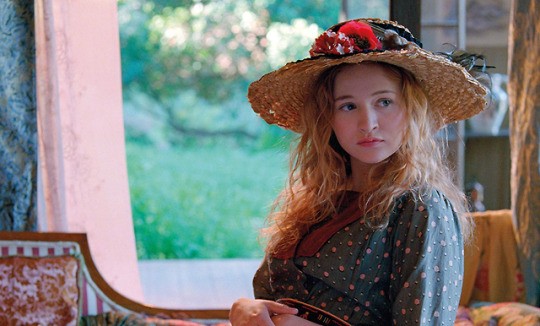
Renoir (2012) Director: Gilles Bourdos, Actores: Vincent Rottiers, Christa Théret, Michel Bouquet, Thomas Doret.
Basada en el libro escrito por el nieto del pintor francés, Renoir es una película que cuenta los últimos años de la vida de Pierre-Auguste Renoir, que dedicó la última parte de su carrera a estudiar el cuerpo femenino, retratándolo constantemente en la naturaleza. También nos cuenta la historia de su última modelo, y como ella se enamoró de su hijo, es a través de sus ojos como conocemos al pintor inmortal, lo conocemos como padre, como patrón, como dueño y como amante, a través de ella le ponemos alma al hombre detrás del pincel, muchas veces el último en el que pensamos al ver sus lienzos.
Andrée es modelo, artista, cantante y actriz, realmente lo que sea, pues el tiempo hace dificil que la gente sea quisquillosa, vive en medio de la Gran Guerra en el sur de Francia, donde muchas veces los soldados no regresan a sus ciudades o lo hacen enfermos o amputados, la expectativa es alta, deben vencer. Ella llega a la casa de Renoir padre, el famoso pintor que ahora, por la artritis y la vejez se ha mudado a una hermosa casa en el clima cálido, donde no hace más que pintar. Al llegar, y tras insistir, es contratada, y se dedica a posar mientras las sirvientas de la casa susurran algo a sus espaldas, todos conocen algo que ella no. Al poco tiempo, desde el frente, llega Jean, el hijo preferido del patrón, con centímetros menos de pierna y suerte de no haber muerto en la batalla. Renoir padre no quiere que regrese, pero Jean no es otra cosa más que soldado, pero poco a poco, gracias a Andrée se dará cuenta de que vale para algo más, y decide probar su suerte con ella.
Una película visualmente hermosa, la fotografía refleja la naturaleza de la provincia francesa y se siente, verdaderamente, como una pintura de Renoir. La producción también es magnífica, cuidando los detalles de la época y del tipo de historia que busca contar. Las actuaciones son de igual manera, excelentes, desde el anciano aferrado de Rottiers, hasta la amorosa y oportunista de Théret, pasando por el niño problemático de Doret y el iluso pero soñador de Bouquet. Renoir es una película excelentemente realizada que, a pesar de que flanquea un poco en su objetivo, entrega un trabajo preciso y hermoso, estéticamente plácido, y perdurable.
#renoir#pierre auguste renoir#jean renoir#gilles bourdos#vincent rottiers#crista theret#michel bouquet#thomas doret#2012#2010s#2010s movies#great war#wwi#wwi history#french cinema#Francia#cine francés#cinéma français
3 notes
·
View notes
Photo



La Marche [The Marchers] (Nabil Ben Yadir - 2013)
#La Marche#The Marchers#Nabil Ben Yadir#French Cinema#Marche pour l’égalité et contre le racisme#French movies#MLK#2010s cinema#2010s movies#European movies#banlieue#European cinema#European society#Marche des beurs#March for Equality and Against Racism.#1980s#human rights#Tewfik Jallab#Vincent Rottiers#M'Barek Belkouk#Nader Boussandel#Lubna Azabal#Hafsia Herzi#Olivier Gourmet#Charlotte Le Bon#Philippe Nahon#Jamel Debbouze#Malik Zidi
0 notes